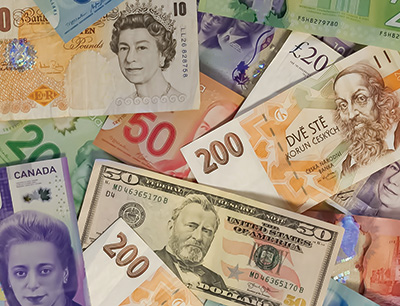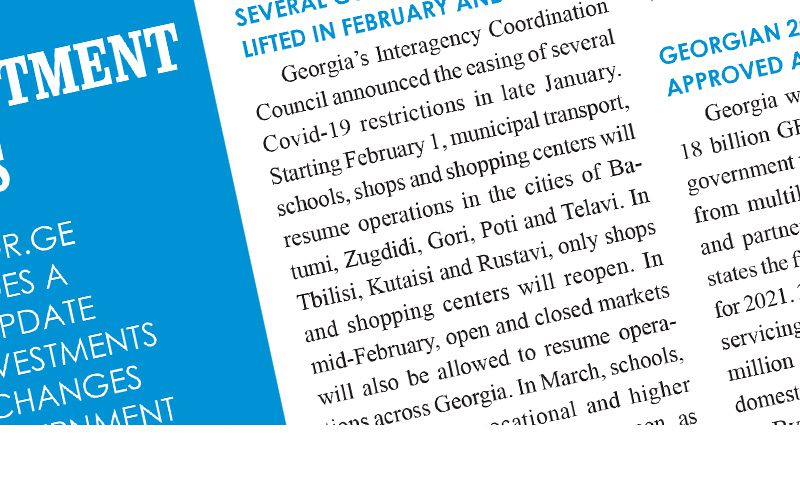Investment News
Investor.ge provides a brief update on investments and changes in government policy that could impact the business environment. Information in this issue was taken from agenda.ge and other sources.
Several Covid-19 restrictions lifted in February and March
Georgia’s Interagency Coordination Council announced the easing of several Covid-19 restrictions in late January. Starting February 1, municipal transport, schools, shops and shopping centers will resume operations in the cities of Batumi, Zugdidi, Gori, Poti and Telavi. In Tbilisi, Kutaisi and Rustavi, only shops and shopping centers will reopen. In mid-February, open and closed markets will also be allowed to resume operations across Georgia. In March, schools, kindergartens, vocational and higher education facilities will also reopen, as will municipal transport.
 Government announces lifting of flight bans
Government announces lifting of flight bans
The Georgian government announced in late January that it would be lifting international flight bans as of February 1. Economy Minister Natia Turnava delivered the announcement, stating that, “all airline companies that have already operated or plan to enter the country’s aviation market in the future will be able to operate regular flights,” noting that rules for visitors from different countries would be finalized in the coming weeks.
Georgian 2021 state budget approved at 18 billion GEL
Georgia will have a state budget of 18 billion GEL in 2021. The Georgian government will borrow 5.3 billion GEL from multilateral and bilateral donors and partners in external debt in 2021, states the final version of the state budget for 2021. 3.1 billion GEL will be spent on servicing external state debt, while 570 million GEL will be spent on servicing domestic state debt.
By the end of 2021, state debt is forecasted to stand at 33.68 billion GEL, consisting of external debt of 27.73 billion GEL and domestic debt of 5.95 billion GEL. The five largest recipients of budget funds will include: Ministry of IDPs from the Occupied Territories, Labor, Health and Social Affairs – 5.56 billion GEL; Ministry of Regional Development and Infrastructure – 2.42 billion GEL; Ministry of Education, Science, Culture and Sport – 1.8 billion GEL; Ministry of Defense – 900 million GEL, and; Ministry of Internal Affairs – 790 million GEL.
Overview of employment, average salaries and business turnover in Georgian economy in Q3 2020
Third-quarter 2020 data shows the Georgian business sector employed 7.2% fewer individuals compared to the same period of 2019. The majority of people (46.9%) worked in small businesses, 42.5% were employed in large businesses, and the remaining 20.6% worked in medium-sized businesses, said the National Statistics Office of Georgia.
Meanwhile the average monthly salary for a person employed in the business sector decreased by 10.3 GEL y/y in the third quarter of 2020 and totalled 1,305.9 GEL.
Average monthly salaries based on the size of business were as follows: medium-sized businesses: 1,487.6 GEL per month; large businesses: 1,297.2 GEL; small businesses: 1,186 GEL. The average monthly salary for women in the business sector was 998.3 GEL, which is 18.5 GEL more compared to the same period of 2018.
The turnover enjoyed by Georgia’s business sector increased by 0.6% in the third quarter of 2020 and reached 29.2 billion GEL. Large businesses made up the majority of total turnover (57.1%), followed by small businesses (25.2%), and then medium-sized businesses (17.7%).
The trade sector had the highest share (38.3 %) in the total turnover in business sector, followed by: arts, entertainment and recreation – 28.4%; manufacturing – 9.7%; construction – 7.9%; transportation and storage – 4.5%; electricity, gas, steam and air conditioning supply – 2.6%; other sectors – 8.7%.
Georgian external trade amounts to $11.3 billion in 2020
The trade deficit (an economic measure of the negative balance of trade in which a country’s imports exceed its exports) amounted to $4.66 billion and its share in trade turnover constituted 41.1%. Georgia’s external trade turnover amounted to $11.3 billion in 2020, which is a decrease of 14.8% compared to last year, show preliminary data from the National Statistics Office of Georgia (Geostat). The value of exports decreased 12% and amounted to $3.34 billion, while imports decreased 15.9%, amounting to $8 billion.
 Swiss chocolate producer Camille Bloch enters Georgia
Swiss chocolate producer Camille Bloch enters Georgia
Swiss chocolate producer Camille Bloch has entered Georgia with the support of Enterprise Georgia. Camille Bloch will plant 650 hectares of hazelnuts and build a processing plant, with a total project cost exceeding $10 million. Camille Bloch has been in the chocolate business for 91 years.
World Bank predicts 4% growth in Georgian economy in 2021, Georgian Central Bank forecasts 5%
World Bank data shows that Georgian GDP will have decreased by 6% in 2020, whereas the bank forecasts the Georgian economy to grow by 4% in 2021 and by 6% in 2022.
The bank writes that regional GDP in Europe and Central Asia is estimated to have contracted 2.9% over the past year, while this year the regional economy is forecast to expand only moderately, by 3.3 %, “as the resurgence of COVID-19 cases causes persistent disruptions to activity.” The global economy decreased by 4.3% in 2020, says the World Bank, but is expected to expand by 4% in 2021, “assuming an initial COVID-19 vaccine rollout becomes widespread throughout the year.”
Meanwhile, the governor of the National Bank of Georgia, Koba Gvenetadze, projects the Georgian economy will grow 5% in 2021. “We think that in 2021 the economy can grow 5%. Do not forget that a fiscal stimulus is also planned at a fairly high level, while lending activity is maintained. We have to take into account that it is very difficult to make predictions during the pandemic and there is a lot of uncertainty,” Gvenetadze said.
Global Sustainable Competitiveness Index: Georgia ranks 37th among 180 countries
Georgia has ranked 37th among 180 countries in the 2020 Global Sustainable Competitiveness Index. The Global Sustainable Competitiveness Index measures the sustainable competitiveness of countries by calculating 116 measurable, quantitative indicators derived from sources such as the World Bank, the IMF, and various UN agencies.
December 2020: CPI index down 1%, annual inflation amounts to 2.4%
The Consumer Price Index, a measure that examines the weighted average of prices of a basket of consumer goods and services, such as transportation, food, and medical care, decreased by 1% in December 2020 compared to the previous month, while the annual inflation rate amounted to 2.4%, show data from the National Statistics Office of Georgia (GeoStat).
With regard to the annual core inflation rate (calculated by excluding the following groups of goods and services from the consumer basket: food and non-alcoholic beverages, energy, regulated tariffs, and transport) prices increased by 5.3%, while the annual core inflation rate without tobacco amounted to 4.9%.
The monthly inflation rate was mainly influenced by price changes for the following groups: monthly prices of housing, water, electricity, gas and other fuels decreased 22.0%, which contributed -1.89 percentage points to the monthly inflation rate.
Prices of food and non-alcoholic beverages increased by 2.1%, contributing 0.69 percentage points to the overall monthly inflation rate.
Prices were higher for the following subgroups: vegetables – 6.5%; milk, cheese and eggs – 4.2%; fruit and grapes – 3.8%; oils and fats – 3.5%, and; fish – 1.9%.
The price of transport increased by 2.4%, contributing 0.26 percentage points to the overall monthly inflation rate. Within the group, prices increased for operation of personal transport equipment (4.1%). Along with this, prices decreased for the purchase of vehicles (-1.3%).
 Georgia’s Enguri HPP closes for three months for repairs, Abkhazia to receive electricity from Russia
Georgia’s Enguri HPP closes for three months for repairs, Abkhazia to receive electricity from Russia
Starting January 20, the Enguri hydro power plant (HPP), the largest electricity producer supplying Georgia’s Russian-occupied region of Abkhazia, has shut for repairs for three months.
Georgian Economy Minister Natia Turnava said that while the dam is closed Abkhazia will receive electricity imported from Russia: “Shutting down the Enguri HPP will not damage our energy system, as seasonal production is minimal at this time…Abkhazia will receive imported electricity from Russia and they will pay for it – we are not participating in this process.”
Director of the Enguri HPP Levan Mebonia, said that during the shutdown of the HPP, Georgia will lose more than 400 million kWh of electricity. Renovation of the Inguri HPP tunnel was postponed three times: first, the repair was planned for 2018, then for 2019. The next deadline was set for March 2020. The European Bank for Reconstruction and Development (EBRD) allocated a loan of €28 million for renovating the HPP in 2018. In addition, last year the EBRD allocated an additional €10 million for the project.
Georgian economy shrinks 5.6% in the third quarter of 2020
Nominal gross domestic product (GDP) amounted to 13.33 billion GEL in the third quarter of 2020 in Georgia, with real GDP declining 5.6% year-on-year, show preliminary data from the National Statistics Office of Georgia (Geostat).
A decrease was registered in the following activities: accommodation and food service activities (-53.1%); transportation and storage (-25%); arts, entertainment and recreation (-32.4%); administrative and support service activities (-49%); professional, scientific and technical activities (-12.5%), electricity, gas, steam and air conditioning supply (-11.5%), financial and insurance activities (-4.4%).
Real growth was registered in the following sectors: public administration and defense and compulsory social security (4.3%); human health and social work activities (6.6%);
education (5.6%); mining and quarrying (14.7%); construction (2%); and agriculture, forestry and fishing (1.5%).
 December 2020: money transfers to Georgia up nearly 16%
December 2020: money transfers to Georgia up nearly 16%
Georgia received $199.7 million in remittances from abroad in December 2020, which is 15.9% more than the amount it received in December 2019, says the National Bank of Georgia. More than one-third of money transfers (41.4%) come to Georgia from the European Union, which amounted to $82.6 million in December 2020.
Russia (20.4%), Italy (15.9%) and Greece (11.2%) were the largest remittance senders in December 2020. $24.7 million was transferred from Georgia to foreign countries in December 2020, which is 3.4% less compared to the same period of the previous year.
Georgia third in Transparency International’s Government Defense Integrity index for Central, Eastern Europe
Transparency International’s Government Defense Integrity Index (GDI) for 2020 shows Georgia placed third in Central and Eastern Europe after Latvia and North Macedonia, with some of the least corruption risk in the region.
The GDI is designed to measure corruption risk in defense and security institutions. It assesses the existence, effectiveness, and enforcement of institutional safeguards against corruption across five key risk areas: financial, operational, personnel, political, and procurement. Georgia ranked third in politics, sixth in finance, and second in personnel, and second in the operational category, while it took sixth place in terms of procurement.
Georgia received a score of 60 out of 100, placing it in the category of having “moderate risk of corruption in the field of defense.”
In the ranking, 100 points indicate the lowest risk of corruption, while 0 indicates the highest risk. Five other countries from the Central and Eastern Europe region which also have a moderate risk of corruption according to the GDI index are Lithuania, Estonia, Poland, Bosnia and Herzegovina, and Northern Macedonia. Latvia received the highest score – 67 (low risk) and Azerbaijan the lowest – 15 (critical risk) in the region.
FDI down almost 24% in the third quarter of 2020
Foreign direct investment (FDI) in Georgia amounted to $302.6 million in the third quarter of 2020, down 23.6% from the adjusted data of the same quarter of 2019, and up 25.2% from the preliminary data of the second quarter of 2020, show the latest data of the National Statistics Office of Georgia (Geostat).
“The decline of FDI figures in the third quarter of 2020 was mainly driven by a decrease in the hotel and restaurant (-$28 million), transport (-$21 million) and real estate (-$16 million) sectors,” said Geostat.
The top three countries that invested the most in Georgia in the third quarter of 2020 were as follows: the United Kingdom – $117.7 million (38.9%), the Netherlands – $79.3 million (26.2%) and the United States – $24.2 million (8%).
The largest share of FDI was registered in the financial sector, reaching $128.3 million in the third quarter of 2020, the energy sector was in second place with $37.1 million, followed by the manufacturing sector with $36.6 million.
____________________________ ADVERTISEMENT ____________________________


